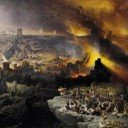In this post we will begin to examine how the word Armageddon is used and exactly what has gone on historically on this plain called Megiddo.
As mentioned previously Armageddon actually means the mountain of Megiddo. The problem, of course, being that there is no mountain near Megiddo. The closest mountain would be Mt. Carmel. Perhaps the author of Revelation is relating the events he saw to the most popular event related to Mt. Carmel. That would be Elijah’s confrontation with the Prophets of Baal. Here God showed a great a mighty victory over the false god and it’s prophets.
Interestingly enough the story line in Revelation stops there and Armageddon is not mentioned again. Immediately after the gathering of the armies in Armageddon we are told a seventh angel blows it’s horn to pronounce “the end.” This end is pronounced and then we only ever here about the armies being lead later by the Beast in which the rider on the white horse destroys. But what takes place at Armageddon is not revealed and leads many to conclude, with this writer, that this is a symbolic reference related to events from the Old Testament in Megiddo that John’s readers should be familiar with.
So, what does this mean? This means that the term Armageddon would be look the contemporary use of “Waterloo.” When we state that an army has met their “Waterloo” we are referencing the famous defeat of Napoleon. That would mean when we use it today it would reference the defeat of someone or something. The mighty New England Patriots faced their “Waterloo” at the 2008 Superbowl against the New York Giants.
In this Biblical narrative “Babylon the Great” meets her “Waterloo” or, better yet, her “Armageddon” at the hands of the armies that are surrounding her. What would this mean to the readers of the letter in the first century? Would they or should they be familiar with events that took place at Megiddo centuries before that this possibly would refer to?
Though most of the references in the Old Testament related to Megiddo and in reference to the king from that area, there are three battles in which Israel was involved with on that famous plain.We will look at those battles, but one quick side note of importance.
It should be noted the one important value of Megiddo is that through it did cross the great majority of trading routes at the time. It was considered important for that area to be remain free and clear of skirmishes or trouble because the impact it would have on trade and commerce throughout the whole region. So, whoever controlled the Megiddo controlled commerce.
In Judges 5 we here of a battle at Megiddo in which the kings came to fight but were unsuccessful against Israel and were not able to gain the spoils they were searching and battling for. That was the only time that Israel saw success at Megiddo.
There are two famous Old Testament battles in which God curses Israel with horrific defeat. In both instances the king at the time was killed in the battle. In 2 Kings 9 we read of a battle in which the Israelites were destroyed and the evil king Ahaziah was killed. In 2 Chronicles 35 we read of the battle in which the good king, Josiah, lost his life.
To to the Israelite that thought of Megiddo was painful. They remembered loss and defeat. This was the primary view of the place and the first century reader would be familiar with this idea. This “Waterloo” for the Jews would occur in a real time event in 70AD. They would be surrounded by the armies of the world, which ,in fact, was exactly what the Roman army was comprised of. This would spell and predict doom for Babylon the whore.
This is a theme we will deal with in much more detail when we examine the book of Revelation in much more detail in future posts. But for now we must consider the uniqueness of the imagery and the very limited amount of information available to us as this is the only instance of the phrase. With that in mind we would be best to consider how the first century reader would perceive the usage. I believe the argument stated above most readily identified that possibility.
Next, though, we will consider the famous Ezekiel 38 and 39 battle to determine how, or if, it applies to the book of Revelation. Is it a parallel account or a separate event alluded to within the final pages of the book of Revelation?





No comments:
Post a Comment